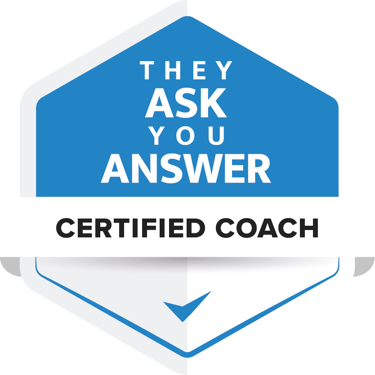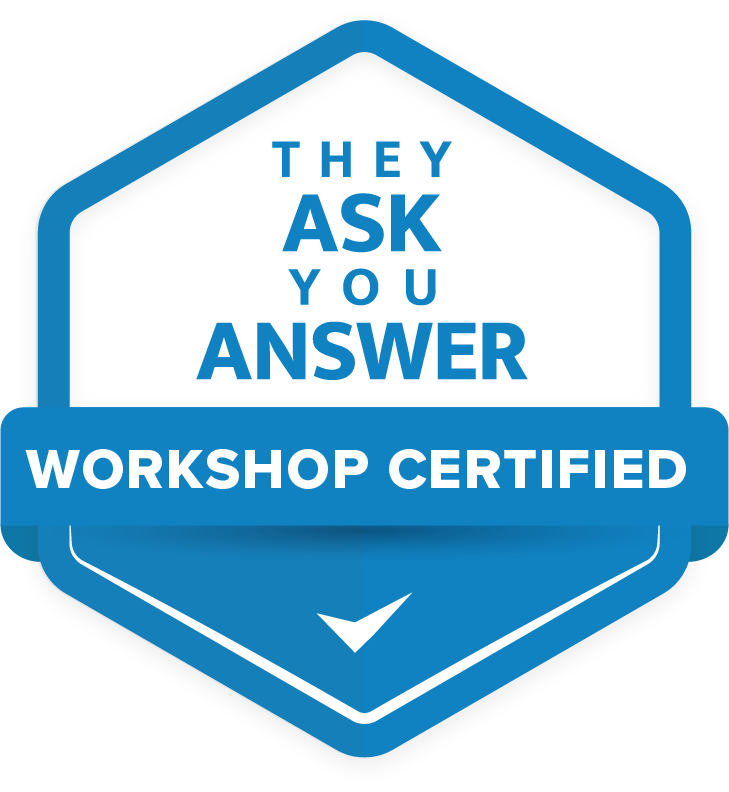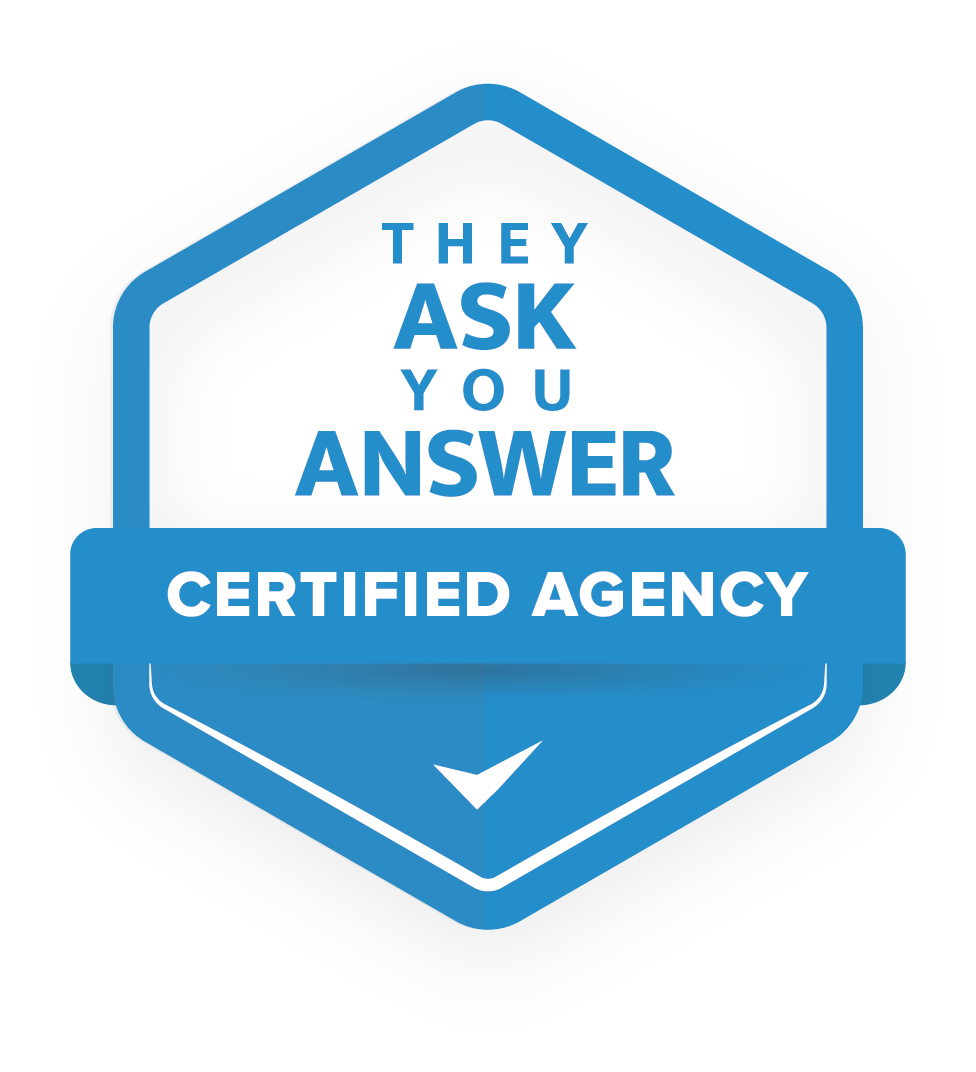Can every senior content manager become a TAYA content manager?

You're excited about They Ask, You Answer and have decided you're serious about doing this. One of the first things to do then is to hire or internally assign a content manager to be in charge of all your content marketing efforts.
Maybe you don't have a content manager yet and are now looking for someone with experience so you can get started nice and quickly. Or maybe you already have someone within your company with writing experience who can fill the role of content manager. Piece of cake, you think. 'With an experienced content writer, I'm quickly on track with TAYA.'
Then it is good to be aware of three things:
I myself ran into this in my previous role as CMO at SaaS company To-increase.
We implemented TAYA within our company and had to train our existing content team, which at the time consisted of three content writers. One was a senior with decades of experience. So I thought: she knows what she's doing, this is going to be a walk in the park.
Famous last words.
Because instead of things going smoothly, I got a lot of backlash from her. She was like, yeah hello, I've been doing this for so long, I don't need to learn how to write content.
I expected us to be in the saddle quickly with a senior on the team, but instead it took longer than I thought.
Fortunately, this story has a happy ending: this person ended up being one of our best content managers.
So in case you are wondering if your senior content manager can eventually become a good TAYA content manager, the short answer is: yes, provided your content manager is willing to be coached by us.
In this article, we address:
By the end of this article, you will have a good idea of what it takes to make a senior content manager a good TAYA content manager.
What's the problem with most senior content managers?
The senior content manager example I shared in the introduction to this article is not an isolated one. Even as a They Ask, You Answer coach, I find that most senior content managers are used to writing in a very different way than is required for TAYA.
This is because they have been taught not to write about their own products, and they don't. Instead, they write about customer problems that aren't necessarily related to the product you're selling, industry trends and developments, and all sorts of other content that doesn't demonstrably increase sales.
A great example of an article that completely misses the mark comes from Marcus Sheridan, founder of They Ask, You Answer, who owned a swimming pool company in the past.
Before he discovered TAYA, the best-performing article on his pool company's website was an article about pool toys. That was obviously a very relevant topic for Marcus' customers, but since he didn't sell pool toys, all that search traffic was of no use to him at all.
Within TAYA, we want content to contribute to more sales. This means that our content must answer the questions our customers have about what we sell. So we have to write about our products and services. This feels unnatural for a content manager who is not used to this.
What does writing according to TAYA entail?
So a content manager who starts working with TAYA content must learn that he can write about your products. But not like many companies do ("Look, we have a new product, come and see what great features it has"), but in a way that connects to what customers really want to know about your products.
Below I elaborate on this.
Writing from the customer's point of view
First, writing from TAYA means that your content manager uses the questions customers ask during sales calls as the starting point for her content. These are questions that are about your products. In particular, the Big Five blog topics for business blogging are important.
These are:
Most content managers are not used to writing about these types of topics at all, so this requires a mindswitch.
Writing with depth
The second is that we go into much more depth in a TAYA article. After reading the article, your customer should not feel that half of their questions went unanswered and that they need another sales call. The content should replace the sales call. So we are looking for another level of quality.
This applies not only to the content of the article, but also to its construction. Each TAYA article must be carefully constructed, looking at things like:
Writing for sales
Third, articles are written primarily so that sales can use them in the sales process. We call this "assignment selling': instead of sales engaging with everyone who shows interest, the prospect is first sent some "homework. For example, a few articles or a video. Sales then engages only with the prospects who have done their homework. These prospects are better informed when they enter the sales conversation and are therefore quicker and more likely to "close" than prospects who enter the conversation completely blank.
Again, this is different than in "traditional" content marketing. Often marketers do keyword research first and base what they are going to write about on that. But TAYA turns it around and starts with the buyer's questions. The articles are optimized for SEO, of course, but keyword research is not the starting point.
What does it take to become a good TAYA content manager?
Having the mindset of a journalist
The single most important quality a TAYA content manager must possess is that he has the mindset of a journalist and a teacher. In other words, he must enjoy imparting knowledge and want to explain things well.
To do this, it is important that the content manager is good at interviewing and can probe in such a way as to arrive at the depth needed to replace a sales conversation with a piece of content.
Being coachable
In addition, a TAYA content manager must be coachable. For example, if the senior content manager we cited in the intro to this article had not been willing to start writing in the TAYA way, she would have stopped the growth of the entire company. After all, your content is only as good as your content manager.
Senior content managers often think they already know everything and therefore have nothing more to learn. But my experience is that every content manager, no matter how experienced, gets something out of the coaching and training. Even if he already knows everything, chances are he doesn't do everything. And that's where the TAYA Mastery program comes in.
Being able to write well
Finally, the content manager must obviously be a good writer. He is responsible for producing high-quality content that attracts visitors to the website and generates sales. The content he writes must convey your expertise and authority and inspire confidence in the reader. This requires very different skills than "just being able to write well. We repeat: a senior content writer is not automatically also a good TAYA content manager.
Tips for the brand new TAYA content manager
For any subject matter expert, it can be quite confronting to do her job to everyone's satisfaction for years and then suddenly be told there is room for improvement.
For content managers, this is no different; my colleague Renske knows all about it:
I have over 10 years of experience in content marketing and I was also familiar with They Ask, You Answer. So that will be a breeze, I thought when I joined Buzzlytics as a content manager. But when I had written my first article, I received a 20-minute video with all kinds of tips for improvement. That's when I thought some unkind things: had this Lucas himself ever actually written an article? What did he know about it? I would give him feedback, pfff.
Fortunately, things worked out quite well between Renske and me, and she is happy to share her tips at the end of this article for senior content managers who are in the same boat as her.
Give yourself time
First, Renske points out that as a content manager, it is important to give yourself time to master TAYA:
They Ask, You Answer seems like a very simple framework on the surface, but it's not until you actively start using it that you realize how comprehensive it actually is. So it can be quite overwhelming. That's why I would advise other content managers to take their time. You don't have to do everything at once, nor is that expected of you at all.
Measure yourself into a growth mindset
Another tip Renske would like to give other senior content managers is to adopt a growth mindset. Growth mindset and fixed mindset is a concept of American psychologist Carol Dweck, who discovered that there are two ways people deal with mistakes and feedback:
Renske explains:
I have a fixed mindset by nature. But I have learned to deal with feedback differently. Often I am offended one day when I get feedback, but the next day I also realize that it is purely my ego that is hurt and that my ego is getting in the way of my personal and professional growth. I had the same thing when I received feedback on that first article. I thought of the quote "ego is the enemy" by author Ryan Holiday the next day and then my irritation was gone immediately.
Check out the courses in IMPACT+
As a senior content manager, it can be tempting to think that you already know everything and there is not much more to learn.
This, too, is recognizable to Renske:
When I was just working at Buzzlytics, Lucas gave me the tip to check out the courses in IMPACT+. "Maybe you can get something out of it," he said gently. 'I've been doing TAYA for a few years,' I thought to myself. 'What new thing could I possibly learn?' Well, that turned out to be quite a lot! Now I set aside a few hours each week for the courses and I consciously practice what I have learned. I notice every week that the quality of my writing improves.
Ask for feedback on your writing from your coach
Finally, Renske advises other content managers to seek feedback on their work from their coach:
Asking for feedback on your work from someone with more knowledge and experience than you is the fastest way to grow as a content manager. I had to completely rewrite one of my first articles, but I barely got any feedback on the second version. That's because I was able to put my wounded ego aside and really work with the feedback.
Everything can be learned
It sounds very logical: assign someone who already has experience with writing to the role of content manager and then you'll quickly be in the saddle They Ask, You Answer. So I totally understand your thinking that way. But as a They Ask, You Answer coach, I've found that TAYA content writing requires specific skills that many experienced content managers haven't yet developed.
At Buzzlytics, we work with senior content managers every day and have found that everything can be learned. The only condition: the content manager must be willing to put her ego aside and be open to coaching.
Does your content manager need help transitioning to TAYA content? In our TAYA Mastery program, we coach and train her to become a top TAYA content manager. Schedule a call with me or one of my colleagues to discuss whether TAYA Mastery is a good fit for you.
Related articles
April 5, 2024
-
Reading time: +/- 12 min
May 28, 2024
-
Reading time: +/- 7 min








